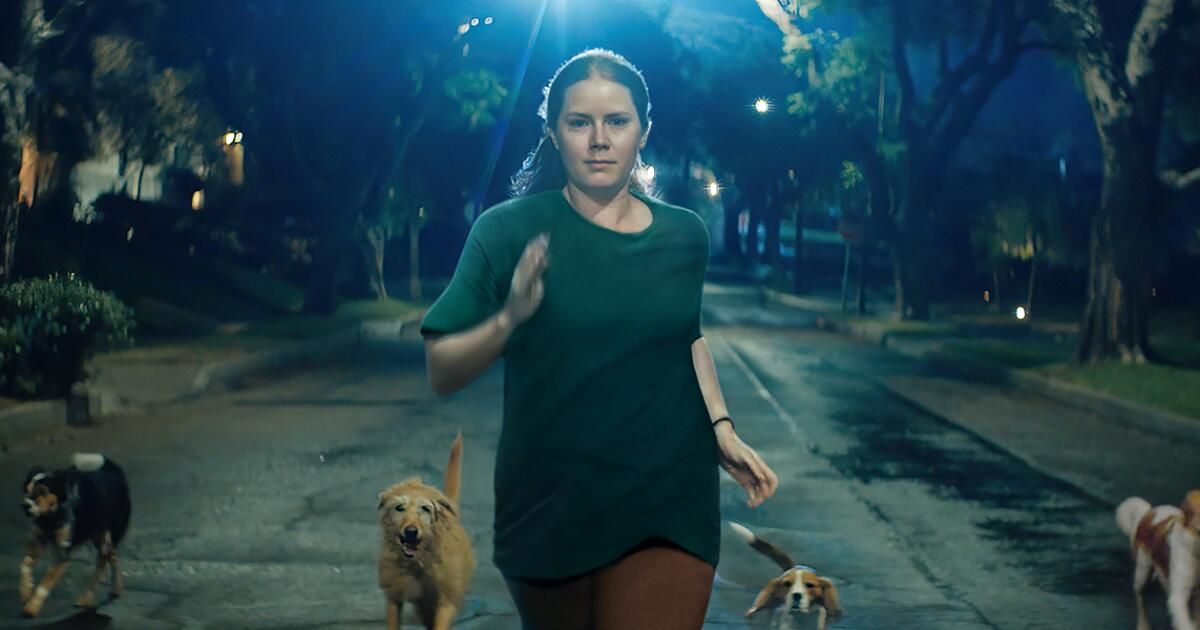“The only thing I learned from making this movie is not to explain to the mother what it is to be a man,” actor Scoot McNairy said onstage after the world premiere of “Nightbitch” on Saturday at the Toronto International Film Festival. “I hope you learn everything I learned, which is to shut up and listen.”
The film, from writer-director Marielle Heller, stars Amy Adams, an artist turned stay-at-home mother who struggles with anger and resentment — and the nagging suspicion that she's turning into a dog.
Critics and awards pundits would do well to heed the actor’s words when it comes to “Nightbitch,” one of the highest-profile films to premiere at the festival this year — and also one that was anticipated with a prevailing sense of “What the hell is this?” Was this a serious movie or a “30 Rock” joke? Ahead of Saturday’s premiere, speculation on social media was rife: Would the film, adapted from Rachel Yoder’s magical realism novel of the same name, finally earn Adams an Oscar after six fruitless nominations? Or would it prove to be a disaster and inspire thousands of excruciating headlines featuring dog puns?
The trailer, which debuted last week, did little to dispel speculation. It made “Nightbitch” seem like a zany, family-friendly version of “Teen Wolf” instead of what it is: a surreal, insightful film about the joys and heartbreak of motherhood, and the sometimes disturbing ways in which becoming a mother can transform women’s minds, bodies, emotional lives and entire sense of identity — even when they’re not growing extra nipples or extra-sharp fangs.
“Isolation… and the transformation of motherhood and fatherhood, it’s something that is a shared experience and yet it’s not shared,” Adams said during Saturday’s post-premiere Q&A.
Adams’ character, whose name is never given and who is credited as “Mother,” has put her promising career on hold to raise her adorable but resilient two-year-old son. Her husband (McNairy), also unnamed, is often away on business trips, leaving the mother to whip up endless pots of macaroni and cheese and take her son to sing-alongs at the local library, where she wistfully scans the room for like-minded mothers to befriend. Her husband means well but is infuriatingly clueless; at one point, he tells Adams’ character that he’d love to stay home all day instead of working (it doesn’t go over well).
As her frustration and anger mount, the mother begins to notice some strange physical changes: a heightened sense of smell, a craving for raw meat, a patch of thick white hair on her lower back. At first she is disturbed, but eventually decides to embrace her wild side, leading to a confrontation with her husband over the state of their relationship.
When asked what happened to the interesting and strange girl he married, the mother replies, “She died in childbirth.”
“Nightbitch” is a delicate tonal balancing act, and it works largely thanks to Adams, who fully commits to the role and can also switch from sunny sweetness to incandescent fury at the push of a button. In one of the film’s most memorable sequences, she sings the “Weird Al” Yankovic classic “Dare to Be Stupid.” And that’s exactly what she does, and she does it with aplomb.
Initial reactions to the film seemed intent on painting it as an unsavory mess. An early headline in Variety read “Amy Adams’ ‘Nightbitch’ Misses TIFF With Dog Poop, Cat Murder and Menstruation in the Shower,” which is both oddly squeamish (what exactly is so offensive about menstruating in the shower?) and also underestimates the festival-going public’s tolerance for dead animals and bodily secretions (both of which were featured prominently in Ron Howard’s survival drama “Eden,” which screened immediately before “Nightbitch”).
Instant reactions like this failed to take into account that the audience's groans might not be of disgust, but of recognition. I know I reacted audibly to a sequence in which the husband offers to bathe his son, but then interrupts the mother's nap on the couch with a thousand questions he could easily answer himself, rendering the whole gesture pointless. During the cathartic scene in which the mother confronts the husband about his ignorance, a woman sitting near me exclaimed, “It's about time!”
As more reviews have come in, responses have been mixed. Maybe Heller wasn't grim enough. Maybe the dog metaphor is too forced. Maybe all of this is off-putting to awards voters.
None of this should be surprising, given the subject matter. Like every other book, movie, TV show or opinion piece that tries to say something about motherhood, “Nightbitch” will be a controversial book. It will inspire a million controversial opinions, many of them negative, and it may even win a few awards. It won’t be for everyone. A bit like motherhood itself.












